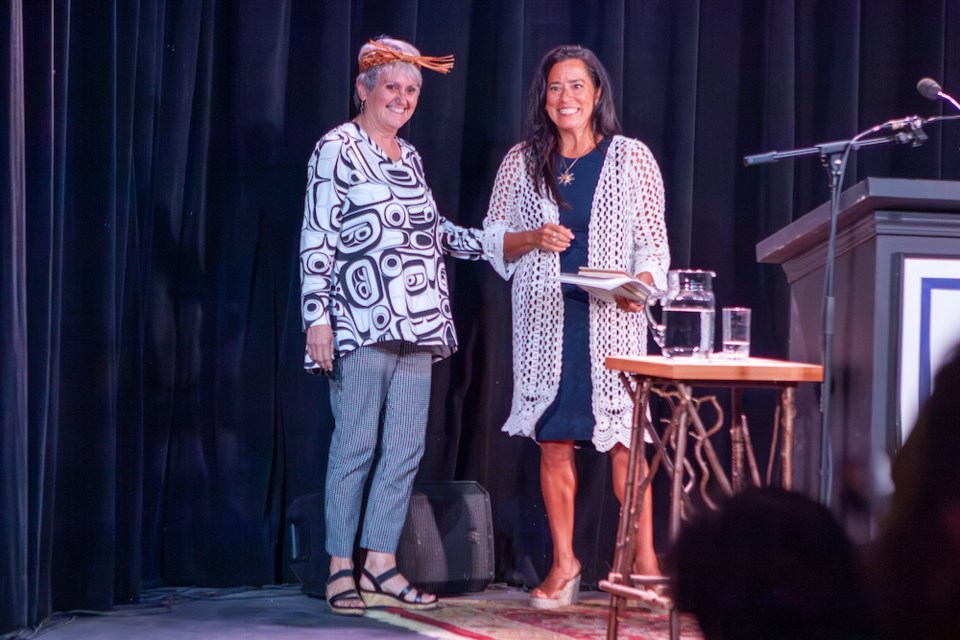An emphatic call to action by one of Canada’s most prominent Indigenous leaders became the crux of the 41st annual Sunshine Coast Festival of the Written Arts.
Jody Wilson-Raybould, who served as Minister of Justice and Attorney General of Canada from 2015 to 2019 and a Member of Parliament until 2021, delivered the keynote Rockwood Lecture to a capacity audience in Sechelt on Aug. 19.
“I want to challenge each of you to be leaders in the work of advancing reconciliation,” said Wilson-Raybould. Her most recent book, True Reconciliation: How to Be a Force for Change, was published late last year.
“I think each of you can be, and indeed must be, leaders in the work of reconciliation as a community. By working together and creating new stories you can and must be in-betweeners,” she continued, urging listeners to eliminate ideological and organizational barriers.
Wilson-Raybould drew on her own experience as part of the Kwakwakaʼwakw First Nation and the first woman elected as an independent member to the federal parliament. Visibility, she said, carries an onus of action.
“Being a first or an only, I had the responsibility to point out what was being said or done in ways that did not account for the perspectives or experiences of so many people,” she said.
Wilson-Raybould was introduced by lhe hiwus (Chief) yalxwemult (Lenora Joe) of the shíshálh Nation. Wilson-Raybould highlighted Joe’s status as the first female shíshálh elected chief — and the Nation’s success at achieving self-government in 1986.
Thirty seven years later, there remains no legislative formula for First Nations to achieve self-government. Court actions are still required to achieve the shíshálh Nation’s level of autonomy.
“The core of the question,” explained Wilson-Raybould in response to a query, “is how the federal government can support Indigenous nations rebuilding governing structures in a way that is across the board, enabling communities to get out from under that incredibly racist statue called the Indian Act.”
“First Nations rebuilding their governments and nations is at the very core of the work of reconciliation,” she said. “It is only by First Nations assuming responsibility for the well-being of their citizens through their own laws and jurisdictions that the ills of colonialism can be mitigated and addressed.”
CBC Vancouver journalist Angela Sterritt, whose recent book Unbroken investigates the murders and disappearances of Indigenous women, was one of 30 other authors to appear at the festival. Sterritt emphasized how colonial policies and attitudes affect every aspect of Indigenous life in Canada.
Existential matters dominated the topics discussed by visiting authors of nonfiction works. John Vaillant, whose book Fire Weather documents the evacuation of Fort McMurray in 2016, presented on the same day that citizens of Yellowknife were fleeing a similar wildfire. CBC science broadcaster Bob McDonald surveyed some of the technological responses to climate change which he collected in his most recent publication, The Future is Now.
Prominent Sunshine Coast authors were strongly represented, with a contingent including essayists J. Edward Chamberlin and Theresa Kishkan and novelist Janie Chang. Local singer-songwriter Simon Paradis appeared with journalist Adriana Barton to illustrate principles from Barton’s book Wired for Music using his guitar and vocals.
A corps of more than 100 volunteers served guests and visiting authors during the four-day event, which this year included enhanced facility lighting and projected transcriptions of live presentations. The dates of next year’s festival were announced as Aug. 15 to 18.




